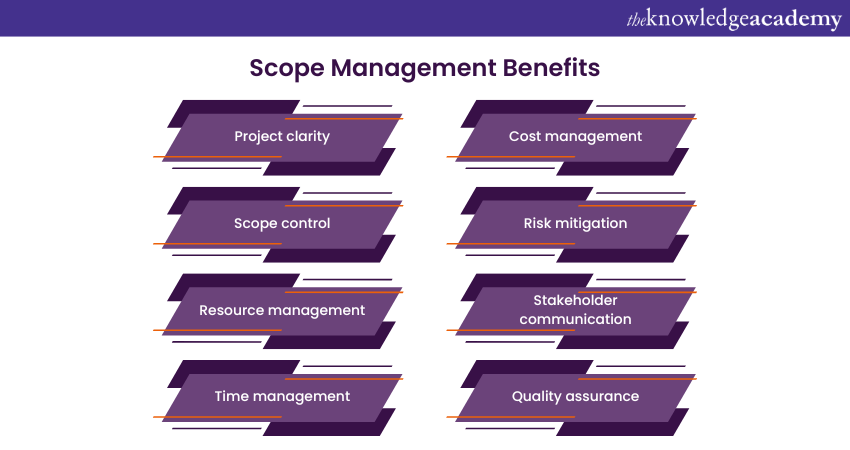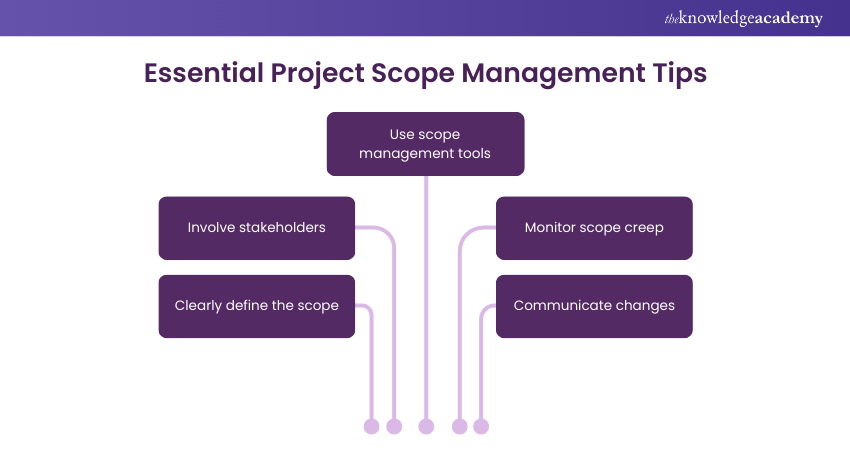We may not have the course you’re looking for. If you enquire or give us a call on +61 1-800-150644 and speak to our training experts, we may still be able to help with your training requirements.
Training Outcomes Within Your Budget!
We ensure quality, budget-alignment, and timely delivery by our expert instructors.

Understanding What is Scope in Project Management plays a critical role in project success. It serves as the backbone, clearly defining what will be accomplished and, equally important, what won’t be. Without a well-defined scope, projects can fall victim to scope creep, where uncontrolled changes or continuous expansion distort the original project plan
In this blog, we will dive into the Project Management world and unravel its intricacies. Read this blog to learn everything about What is Scope in Project Management, its importance, the processes involved and the best practices. Let’s dive in to ensure that your next project is a triumph!
Table of Contents
1) Understanding What is a Scope in Project Management
2) Importance of Scope in Project Management
3) Project Scope Management Steps
4) Five Tips for an Effective Project Scope Management
5) Conclusion
Understanding What is a Scope in Project Management
In Project Management, a scope defines all the tasks that are needed for a project to meet its planned goals. This determines what is going to be provided and what is not. Its definition includes project objectives, products, activities, schedule, costs, and the necessary means for the project implementation.
A well-defined Project Management Scope creates a foundation for Project Planning, helps to establish realistic Project Management Timelines, allocate resources effectively, and manage stakeholder expectations. It also involves defining, validating, and controlling changes to the Project Scope. Effective Scope Management requires continuous communication, collaboration, and proactive monitoring. By doing so, it ensures that the project is on track and delivers the intended results.
Importance of Scope in Project Management
Managing the scope is a pivotal aspect of Project Management as it directly influences the project’s timeline and financial plan. This is mainly because the Scope Management involves accomplishing the project’s objectives within the agreed-upon timeframe and budget set by the stakeholders. Implementing a robust Scope Management strategy enables Project Managers to attain the following:

By defining scope effectively, Project Managers can increase the likelihood of project success. This also helps them achieve the following objectives:
a) Develop feasible project outlines
b) Prevent complications such as budget excess and Project Scope expansion
c) Clarify expectations for all project participants
d) Recruit team members who possess the necessary expertise and credentials for the project
e) Adhere to project timelines
f) Deliver outputs of superior quality
g) Formulate procedures for managing changes
Gain the confidence to successfully lead small-scale initiatives from start to finish – join our Running Small Projects Training now!
Project Scope Management Steps
Project Scope Management is vital to Project Planning and Project Execution, ensuring that projects are completed successfully within defined parameters. Now that you are familiar with What is Scope in Project Management, here's an in-depth look at the essential steps involved in effective Project Scope Management:
1) Define the Project Scope
The commencing step in Project Scope Management is defining the Scope of the project. This involves clearly outlining the project's objectives, deliverables, tasks, and constraints. Project stakeholders can align their expectations and resources by developing a clear understanding of what needs to be achieved.
Defining the Project Scope involves engaging stakeholders to gather requirements and expectations. This collaborative approach helps ensure that all stakeholders understand the project's goals and objectives. It also helps identify potential conflicts or ambiguities early on, allowing them to be addressed proactively.
2) Write a Project Scope Statement
Once the Project Scope has been defined, the following step is to create a Project Scope statement. This document is a formal agreement between the project team and stakeholders, outlining the project's objectives, deliverables, assumptions, and constraints.
The Project Scope statement provides a clear and concise description of what the project will deliver and what it will not deliver. It helps prevent scope creep by establishing boundaries and guiding project decision-making throughout the project lifecycle.
3) Create a Scope Management plan
A Scope Management plan is essential for effectively managing the Project Scope throughout its lifecycle. This plan outlines how the Project Scope will be defined, validated, and controlled and how changes to the Scope will be managed.
The Scope Management plan includes procedures for identifying, documenting, and addressing changes to the Project Scope. It also defines the essential Project Manager Roles and Responsibilities, ensuring accountability and alignment across the project team.
4) Validating Scope
As the project progresses, validating the scope is essential to ensure that deliverables meet stakeholders' expectations. This involves reviewing completed work against the Project Scope statement and obtaining formal stakeholder acceptance.
Validating Scope requires ongoing communication and collaboration between the project team and stakeholders. It may involve conducting inspections, walkthroughs, or demonstrations to demonstrate that deliverables meet agreed-upon requirements and quality standards.
5) Controlling Scope
Scope control is the process of monitoring and controlling changes to the Project Scope. This involves tracking project performance, identifying deviations from the Project Scope, and taking corrective action as needed to realign the project with its objectives.
Scope control measures help prevent scope creep and ensure the project stays on track. This may involve evaluating change requests, assessing their impact on the Project Scope, budget, and schedule as well as making informed decisions about approving or rejecting them.
Gain a competitive edge with our Project Management Certification – register today and propel your career forward!
Five Tips for an Effective Project Scope Management
Defining the Scope in Project Management is essential for ensuring the success of any project. By defining clear objectives, engaging stakeholders, implementing a robust change control process, breaking down work packages, and monitoring scope performance, Project Managers can proactively manage scope and minimise risks, ultimately increasing the likelihood of project success. Here are five crucial tips to help Project Managers effectively manage Project Scope and minimise risks:

1) Define Clear Project Objectives and Requirements
Start by clearly explaining the project's objectives and requirements in collaboration with stakeholders. This involves identifying deliverables, outlining project boundaries, and establishing measurable goals. A detailed Project Scope statement serves as a reference point throughout the project, helping to prevent scope creep and ensuring everyone is aligned on project expectations.
2) Conduct a Thorough Stakeholder Analysis
Regular communication with stakeholders is vital for managing Project Scope effectively. Engage stakeholders early and often to gather input, clarify expectations, and promptly address any concerns or changes. By fostering open communication channels, Project Managers can proactively manage stakeholder expectations and minimise the risk of Scope changes.
3) Establish a Change Control Process
Develop a formal change control process to manage Scope changes effectively. All proposed changes should be evaluated against the Project Scope statement, impact assessed, and approved or rejected through a defined change control board or process. By implementing a structured change control process, Project Managers can maintain control over Scope changes and prevent unauthorised modifications that could derail the project.
Unlock the power of precision with our Software Estimation Training – book your spot now!
4) Break Down the Work Structure
Break the project work into manageable work packages and create a hierarchical Work Breakdown Structure (WBS). This decomposition allows for a better understanding and management of the Project Scope by dividing the project into smaller, and more manageable components. With a well-defined WBS, Project Managers can track progress, allocate resources effectively, and identify potential Scope risks more efficiently.
5) Regularly Review and Update the Project Scope
Regularly monitor and review Scope performance throughout the project lifecycle. Track progress against the Project Scope statement, identify deviations or variances and take corrective action to realign the project with its original objectives. By maintaining vigilance over Scope performance, Project Managers can address issues promptly, minimise Scope creep, and ensure successful project delivery.
A detailed Project Charter and Project Scope statement serve as reference points throughout the project
Conclusion
The scope in Project Management guides your project to its intended destination. It’s the definitive boundary that delineates what is included in the project and what lies beyond its reach. By firmly establishing What is Scope in Project Management, you ensure clarity, prevent Scope creep, and set the stage for a successful venture. Remember, a well-defined Scope is not just a part of the project—it’s the heart of project achievement.
Acquire the skills to drive success in any project – join our Project Management Courses now!
Frequently Asked Questions

Becoming a certified Project Scope Manager opens doors to higher-paying job opportunities and career advancement. Employers value the expertise, credibility and experience that comes with certification, giving you a competitive edge in the job market.

Efficient Project Scope Management showcases your ability to submit projects on time and within budget, earning you trust and respect among colleagues and clients. It showcases your commitment towards excellence and sets you apart as a reliable and skilled Project Manager.

The Knowledge Academy takes global learning to new heights, offering over 30,000 online courses across 490+ locations in 220 countries. This expansive reach ensures accessibility and convenience for learners worldwide.
Alongside our diverse Online Course Catalogue, encompassing 17 major categories, we go the extra mile by providing a plethora of free educational Online Resources like News updates, Blogs, videos, webinars, and interview questions. Tailoring learning experiences further, professionals can maximise value with customisable Course Bundles of TKA.

The Knowledge Academy’s Knowledge Pass, a prepaid voucher, adds another layer of flexibility, allowing course bookings over a 12-month period. Join us on a journey where education knows no bounds.

The Knowledge Academy offers Project Management Courses including Jira Training, Software Estimation Training, and Smartsheet Training. These courses cater to different skill levels, providing comprehensive insights into the Project controls.
Our Project Management Blogs covers a range of topics related to Project Management Businesses, offering valuable resources, best practices, and industry insights. Whether you are a beginner or looking to advance your Project Management skills, The Knowledge Academy's diverse courses and informative blogs have you covered.
Upcoming Project Management Resources Batches & Dates
Date
 Introduction to Project Management Course
Introduction to Project Management Course
Fri 17th Jan 2025
Fri 7th Mar 2025
Fri 23rd May 2025
Fri 12th Sep 2025
Fri 14th Nov 2025
Fri 12th Dec 2025







 Top Rated Course
Top Rated Course



 If you wish to make any changes to your course, please
If you wish to make any changes to your course, please


